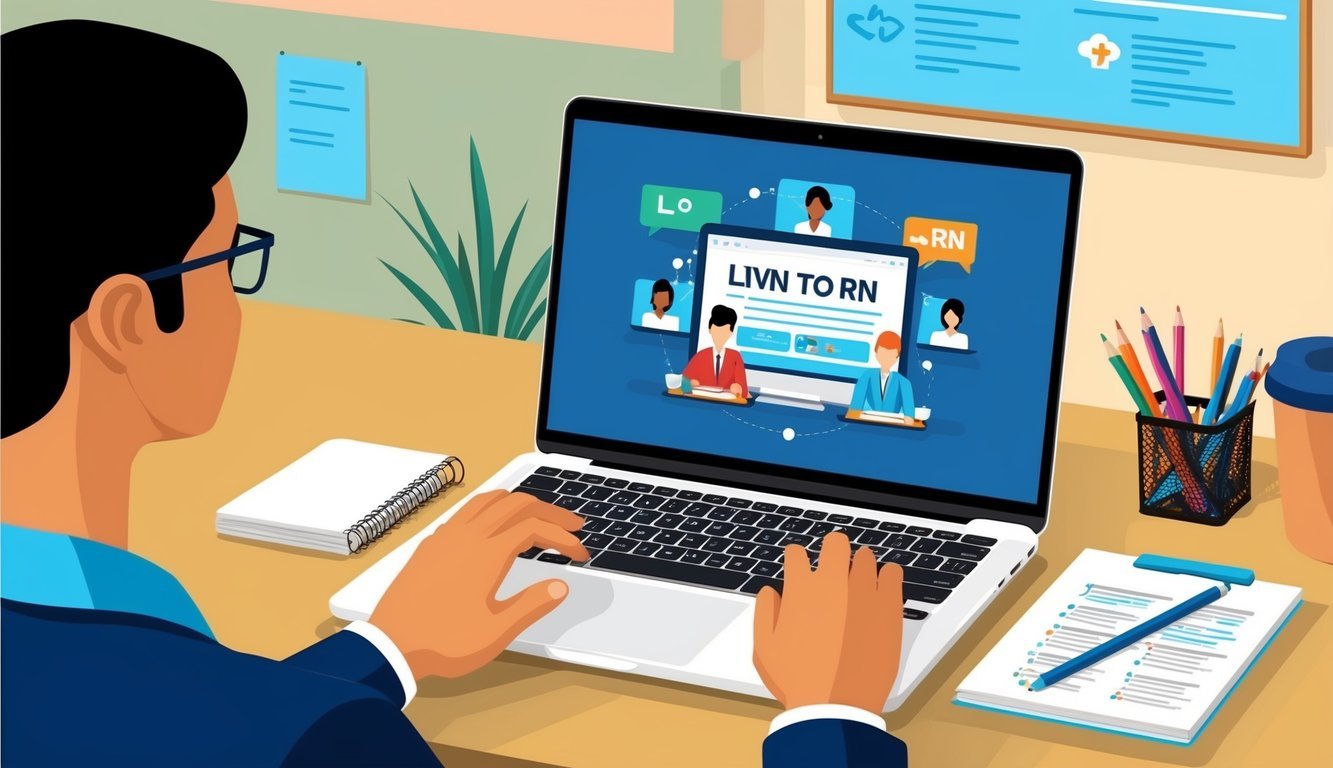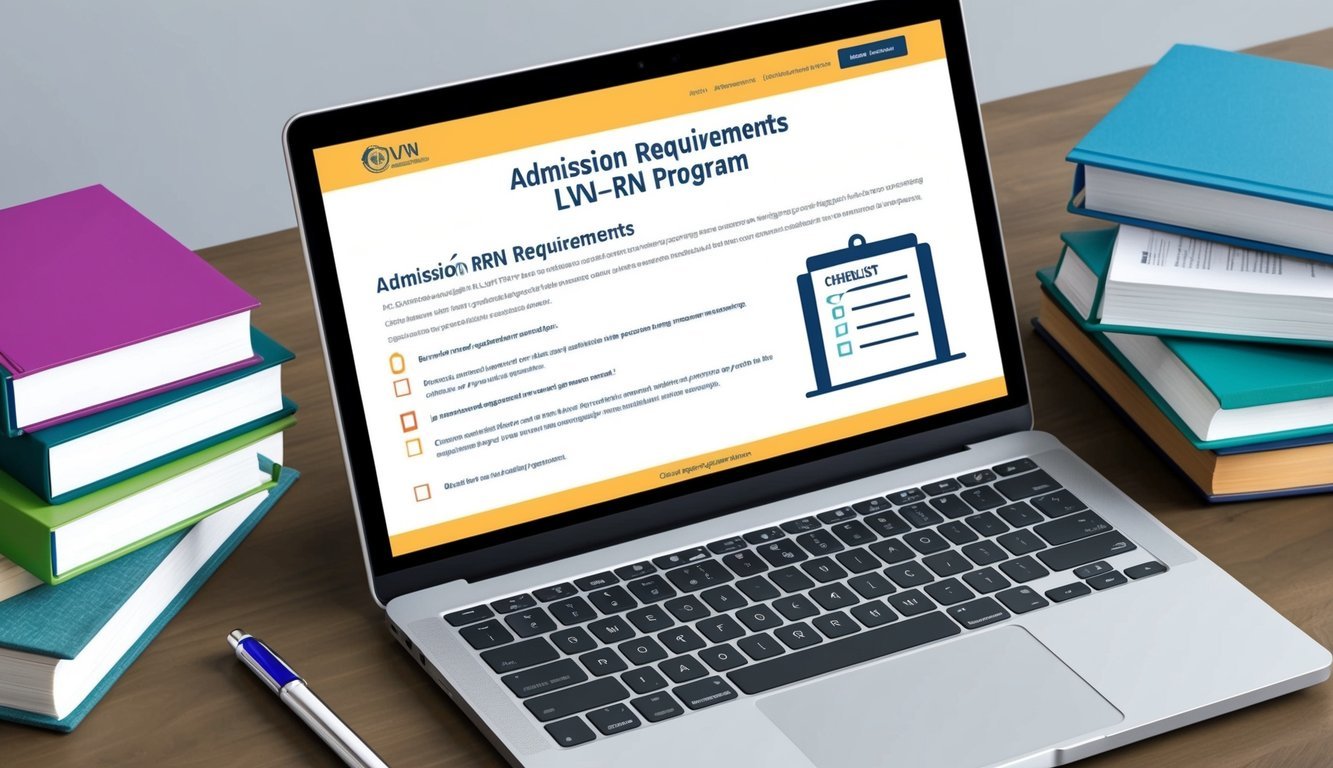Becoming a Registered Nurse (RN) from a Licensed Vocational Nurse (LVN) is an exciting career move that opens up many opportunities in nursing.
With the rise of online education, you can now efficiently transition from LVN to RN through various online bridge programs.
This flexibility allows you to balance your studies with work and personal life, making it an ideal choice for busy professionals.
Online LVN to RN programs typically offer a solid educational framework that prepares you for the demands of the nursing field.
By leveraging technology, these programs provide access to coursework, virtual simulations, and community support, enabling you to acquire the knowledge and skills necessary to thrive as a nurse.
With proper guidance on admission requirements and preparation for licensure exams, you will be well-equipped to take the next step in your nursing career.
Investing your time in an LVN to RN online program could significantly enhance your career trajectory.
Not only will you expand your job prospects and earning potential, but you will also gain a deeper understanding of patient care and health outcomes.
Key Takeaways
- Online bridge programs make it easier to transition from LVN to RN.
- You’ll learn essential nursing skills and prepare for licensure exams.
- Advancing to RN opens up more career opportunities and higher salaries.
Understanding LVN to RN Bridge Programs
LVN to RN bridge programs are designed for licensed vocational nurses (LVNs) who want to become registered nurses (RNs).
These programs provide an educational pathway that acknowledges your existing skills and knowledge.
You can choose from various program formats to suit your needs.
Defining the LVN to RN Pathway
The LVN to RN pathway allows you to transition from being an LVN to an RN.
This progression often requires completing specialized coursework and clinical hours.
Typically, you must hold a valid LVN license and meet specific admission criteria set by the programs.
Many programs evaluate your previous nursing education and experience.
This helps streamline your training.
In most cases, completion of these programs results in earning an Associate Degree in Nursing (ADN) or a Bachelor of Science in Nursing (BSN).
Types of Bridge Programs Available
There are several types of LVN to RN bridge programs that you can consider:
-
Online Programs: These provide flexibility to maintain a job while studying. Many platforms offer 100% online coursework, making it easier to balance your time.
-
Hybrid Programs: Some programs combine online learning with in-person clinical rotations. This format allows for practical experience without sacrificing the convenience of online classes.
-
Accelerated Programs: These are designed for students who already have some college experience. They often have a faster pace, allowing you to complete your degree sooner.
Each program has its requirements, including GPA and prior nursing experience.
Always check with specific institutions for detailed admission guidelines.
For further insights on available programs, visit resources like Nurse.org and RegisteredNursing.org.
Educational Framework and Curriculum

The educational framework for LVN to RN online programs combines a strong theoretical foundation with practical experiences.
This approach ensures you gain essential knowledge and hands-on skills necessary for becoming a registered nurse.
Coursework and Nursing Theory
In your LVN to RN program, you will encounter a variety of nursing theories and concepts.
Coursework typically includes subjects like patient care, pharmacology, and health assessment.
You will study different theories that guide nursing practices.
Understanding these frameworks helps in making informed decisions in patient care.
Many programs use online platforms for delivering lectures and materials.
This allows for flexibility in your study schedule.
You may also find interactive assignments that enhance your learning experience.
Clinical Rotations and Experiences
Clinical rotations are a vital part of your training.
These experiences allow you to apply what you’ve learned in real-world settings.
Most programs partner with local healthcare facilities.
This is where you will gain hands-on experience under the supervision of licensed nurses.
You will rotate through various departments, such as emergency care, pediatrics, and geriatrics.
This helps you develop a well-rounded skill set.
Typically, you must complete a certain number of clinical hours to graduate.
This requirement ensures you have adequate practical experience to become a competent RN.
General Education and Specialized Nursing Courses
In addition to nursing courses, you will complete general education requirements.
These may include subjects like psychology, biology, and communication.
General education courses help develop critical thinking and communication skills needed for your nursing career.
Specialized nursing courses focus on advanced topics.
You might study leadership in nursing, community health, or mental health nursing.
These specialized classes prepare you for various roles within the healthcare system.
They also enhance your academic background, making you more competitive in the job market.
Admission Requirements and Process

To transition from a Licensed Vocational Nurse (LVN) to a Registered Nurse (RN), understanding the admission requirements and application process is crucial.
You must meet specific academic standards, complete certain prerequisites, and follow a defined application procedure, including taking the TEAS exam.
Prerequisites and Academic Criteria
Before applying to an LVN to RN program, you need to complete several prerequisites.
Most programs require you to have:
- Active LVN License: You must hold a current and valid LVN license.
- Prerequisite Courses: Common courses include Anatomy, Physiology, Microbiology, and English.
- Minimum GPA: A GPA of at least 2.5 to 3.0 on a 4.0 scale is often required.
- TEAS Exam: A satisfactory score on the Test of Essential Academic Skills (TEAS) is usually necessary.
Check specific programs for exact courses and GPA requirements, as they can differ.
Many schools, like those listed on NursingProcess.org, provide detailed information.
The Application Steps and TEAS Exam
The application process typically involves several important steps:
- Submit Application: Fill out the application form for the chosen nursing program.
- Official Transcripts: Provide transcripts from previous schools and courses.
- TEAS Exam: Register for and complete the TEAS exam. Aim for a score above the minimum threshold set by the program.
Before starting the application, ensure all documents, such as letters of recommendation and proof of clinical experience, are ready.
Remember that some programs prioritize applicants with experience in acute or long-term care, so highlight relevant work.
Online Program Structure and Delivery
Understanding how online nursing education is structured is vital for your success.
This includes recognizing how courses are delivered, the importance of accreditation, and how to balance your studies with clinical requirements.
Navigating Online Nursing Education
Online nursing programs typically combine theoretical knowledge with practical skills.
Courses are delivered through digital platforms, allowing you to study at your own pace while accessing a range of educational materials.
Key Components:
- Course Materials: Lectures, readings, and multimedia resources.
- Discussion Boards: Engage with peers and instructors.
- Assignments and Exams: Submit work online and complete assessments through the platform.
For a smoother transition, many programs also allow for transfer credits from previous studies.
Make sure to inquire about this option when choosing your program.
Importance of Accreditation
Choosing an accredited institution is crucial for your nursing career.
Accreditation ensures that the program meets specific educational standards.
Benefits of Attending an Accredited Program:
- Eligibility for Financial Aid: Often a requirement for obtaining student loans.
- Transfer Credits: Easier to transfer credits if you switch programs.
- Licensure Requirements: Most states require graduation from an accredited program to sit for the NCLEX-RN exam.
You can check the accreditation status by searching through databases provided by organizations like the Accreditation Commission for Education in Nursing.
Balancing Online Studies with Clinical Requirements
A significant aspect of online LPN to RN programs is integrating clinical experiences with coursework.
Tips for Balancing Responsibilities:
- Scheduled Study Time: Create a consistent study schedule to keep track of assignments and readings.
- Clinical Partnerships: Many online programs partner with local healthcare facilities to provide hands-on training.
- Flexible Hours: Look for programs that offer clinical hours during evenings or weekends.
Ensure you understand the clinical requirements and how they fit within your online coursework.
This balance is essential for gaining the skills needed to thrive in nursing.
Licensure Exam Preparation and Career Transition

Preparing for the NCLEX-RN and transitioning from LVN to RN roles are critical steps in advancing your nursing career.
Understanding the exam requirements and career opportunities available can set you up for success.
Preparing for the NCLEX-RN
The NCLEX-RN is the National Council Licensure Exam you must pass to become a registered nurse.
This exam tests your knowledge and skills across a variety of nursing topics.
To effectively prepare, consider the following strategies:
- Review Study Materials: Use textbooks, online resources, and review courses.
- Practice Tests: Take practice exams to familiarize yourself with the question formats.
- Study Groups: Join or form study groups to gain different perspectives on challenging topics.
Also, explore financial aid options to help cover any costs associated with exam preparation.
Many institutions offer resources to aid in this process.
Advancing from LVN to RN Career Roles
Transitioning from an LVN to an RN opens up a wider range of career opportunities.
RNs typically have higher salaries and more responsibilities than LVNs.
According to recent data, the median salary for RNs is approximately $86,000, while LVNs earn about $59,000.
As an RN, you can choose various specialties such as:
- Emergency Room Nursing
- Pediatric Nursing
- Geriatric Nursing
Obtaining an RN license requires enrolling in a recognized RN education program and passing the NCLEX-RN.
This advancement allows you to take on leadership roles and improve your clinical skills.
Explore educational avenues and financial aid options to make this transition smoother.
Outlook and Advancement Opportunities

The transition from LVN to RN opens many doors for career growth.
You can anticipate strong job demand and potential for increased earnings.
Moreover, pursuing further education enhances your qualifications and marketability in the nursing field.
Growing Demand for Registered Nurses
The demand for registered nurses (RNs) continues to rise significantly.
The U.S. Bureau of Labor Statistics projects a 6% job growth for RNs between 2021 and 2031.
An aging population and an increasing focus on healthcare drive this growth.
More healthcare settings are expanding their services.
As a result, RNs are needed to fill various roles.
This includes positions in hospitals, clinics, and community health organizations.
Many facilities prefer or require RNs to hold a Bachelor of Science in Nursing (BSN) degree.
Advancing your education from an LVN to an RN not only prepares you for these roles but also positions you favorably for future job openings and competitive salaries.
Continuing Education and Higher Degrees
Continuing education is vital for advancing your nursing career.
Earning a BSN degree can significantly increase your career opportunities and earning potential.
Many employers offer incentives for those who pursue higher degrees.
This may include tuition assistance and bonuses.
An advanced degree can lead to roles in management, administration, or specialized nursing fields.
Here’s a brief overview of potential educational paths:
| Degree Type | Description | Career Opportunities |
|---|---|---|
| Associate Degree in Nursing (ADN) | Basic nursing education for entry-level RN roles. | Staff Nurse, Charge Nurse |
| Bachelor of Science in Nursing (BSN) | More comprehensive nursing education, often required for leadership roles. | Nurse Manager, Clinical Nurse Specialist |
| Master of Science in Nursing (MSN) | Advanced practice degree for specialized roles. | Nurse Practitioner, Nurse Educator |
By investing in your education, you not only enhance your skills but also increase your chances for promotions and higher salaries.
Frequently Asked Questions
In this section, you will find important information about eligibility, program duration, and requirements for LVN to RN online programs.
This will help you navigate your options and understand what to expect as you make your transition.
What are the eligibility criteria for enrolling in an accredited LVN to RN online program?
To enroll in an accredited LVN to RN online program, you typically need to hold a valid LVN license.
Many programs also require a certain GPA and completion of prerequisite courses in subjects like biology and anatomy.
Check specific program websites for detailed requirements.
How can I find LVN to RN online programs that are available near me?
To find LVN to RN online programs near you, search online directories that list accredited nursing programs.
Websites like NursingProcess.org provide comparisons and details about different programs available in your area.
You can also contact local nursing schools for information on online offerings.
What is the duration of an accelerated online LPN to RN program?
The duration of an accelerated online LPN to RN program usually ranges from 12 to 24 months.
This depends on factors such as the structure of the program and whether you attend full-time or part-time.
You can often complete clinical hours in your local area during the program.
Are there any LVN to RN bridge programs available online in Texas?
Yes, Texas offers several LVN to RN bridge programs online.
Many of these programs are designed to help students transition smoothly from LVN to RN and may include online coursework along with required clinical placements.
Research specific Texas programs for details on application procedures and deadlines.
In California, what are the requirements for the LVN to RN 30 unit option?
In California, the LVN to RN 30 unit option allows LVNs to complete 30 units of specified nursing courses.
This pathway enables you to become eligible to take the NCLEX-RN exam.
You’ll also need to meet additional requirements regarding clinical practice and theory.
Is it possible for an LPN to take the NCLEX for RNs, and what are the conditions?
Yes, an LPN can take the NCLEX for RNs after completing an accredited LVN to RN program.
Conditions usually include completing required coursework and clinical hours.
Make sure to check with your state nursing board for specific eligibility requirements and regulations before applying.

